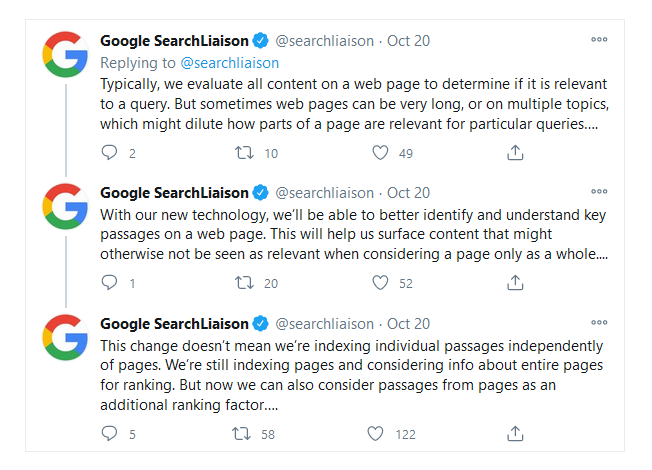
Boost your rankings and attract more customers through our SEO expertise.

Google has announced that its latest and greatest search innovation—passage-based indexing—will affect an estimated 7% of search queries across all languages when fully rolled out across the world. It’s exciting news, for sure, but… what exactly is passage indexing? The search giant explains:
Very specific searches can be the hardest to get right, since sometimes the single sentence that answers your question might be buried deep in a web page. We’ve recently made a breakthrough in ranking and are now able to not just index web pages, but individual passages from the pages. By better understanding the relevancy of specific passages, not just the overall page, we can find that needle-in-a-haystack information you’re looking for.
Google’s press release also revealed how results will appear, noting that it can now understand that the passage on the right-hand side is a lot more relevant to a specific query than the broader content on the left.

Looks a lot like a featured snippet, right? Google thinks so too, and clarified that its new feature will determine the relevance of any web document by understanding passages, whereas featured snippets identify the single most relevant passage in a document they have overall determined to be relevant to the query.
Google’s move will provide more opportunities for sites with less authority but relevant, high-quality content to appear more prominently in search results. It’s a simple premise, yet the nature of the announcement has led to a certain degree of confusion in the SEO community.
The initial confusion comes from Google using the term “indexing” while telling us this is not an indexing update. Google’s public liaison of search, Danny Sullivan, quickly cleared up this apparent contradiction on Twitter:

So, Google’s new passage “indexing” actually has no correlation with the way content is indexed; instead, it’s a ranking factor. Had they chosen a term other than “indexing”, the initial hysteria would have been averted.
During a recent Google Hangout, Senior Webmaster Trends Analyst John Muller reiterated the fact SEOs should not be trying to optimize for this new ranking update. The key is to have a well-structured website rather than making any drastic changes:
It’s not that there’s a separate passage index or anything like that involved. It’s more about understanding the page and the different parts of the page and being able to recognize which of those parts are relevant for user’s query. […] You should make sure that you have clear headings and that you have well-structured content on your pages so that we can recognize these sections, which, to me, is kind of obvious. […]
One thing I would caution from is trying to jump on the train of trying to optimize for these things, because a lot of the changes that we make like these are essentially changes that we make because we notice that web pages are kind of messy and unstructured. And it’s not so much that these messy and unstructured web pages suddenly have an advantage over clean and structured pages.
While we have spent the last few years focusing on creating unique content pages to target those more qualified long-tail terms and queries, this shift could potentially see SEO rediscover its love for longer content pages now that Google can better understand individual passages.
Subscribe to our monthly newsletter.
We believe passage indexing has been introduced for two main reasons. Primarily, Google wants to improve search results for those more focused search terms by retrieving specific passages from relevant-but-less-authoritative websites that otherwise lack the clout to compete for the instant answer space.
Very simply, there’s a more level playing field for passages because they’re not ranked using the same factors as instant results. Attracting searchers with longer-tail, top-of-funnel queries gives businesses (especially those competing against larger rivals) the opportunity to move prospects through the “messy middle”, including making the transition from enterprise to local.
Secondly, Google is continuing to advance its use of natural language and AI in order to stop content creators burrowing deeper into the rabbit hole. Having to create a unique page of content for variations of the same keyword and/or query has long led to diluted, regurgitated content being produced at scale. Happily, SEOs may now be able to discard this approach and instead simply focus on producing relevant, well-structured content.
There isn’t a specific report in Google Search Console showing traffic from passage indexation—yet—but in the coming months we expect Google to provide clearer reporting on passage indexing within Search Console. In the meantime, site owners should expect to see an increase in impressions for pages that have benefited from the updates.
Google plans to roll out this update to English language countries at the end of 2020, with support for other languages following early in 2021. Want to get ahead of the game and find out how you could potentially profit from passage indexing? Our SEO experts would love to hear from you.
Boost your rankings and attract more customers through our SEO expertise.
Subscribe to our monthly newsletter.